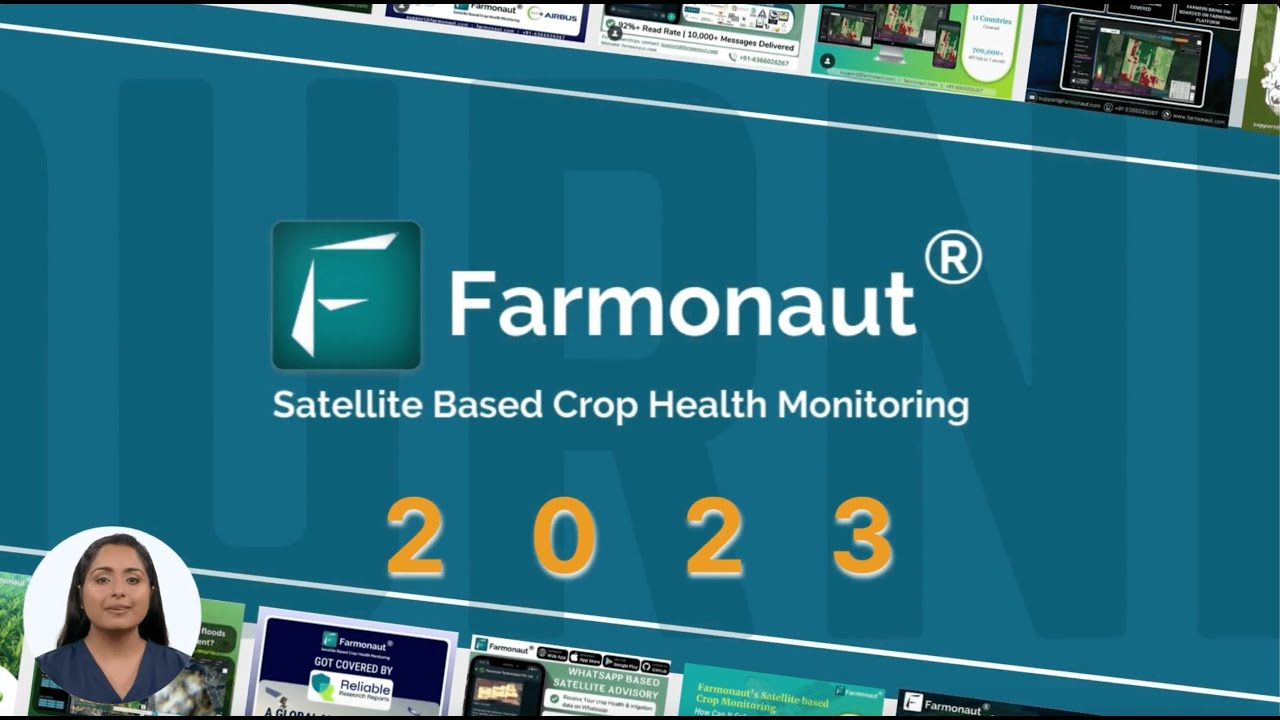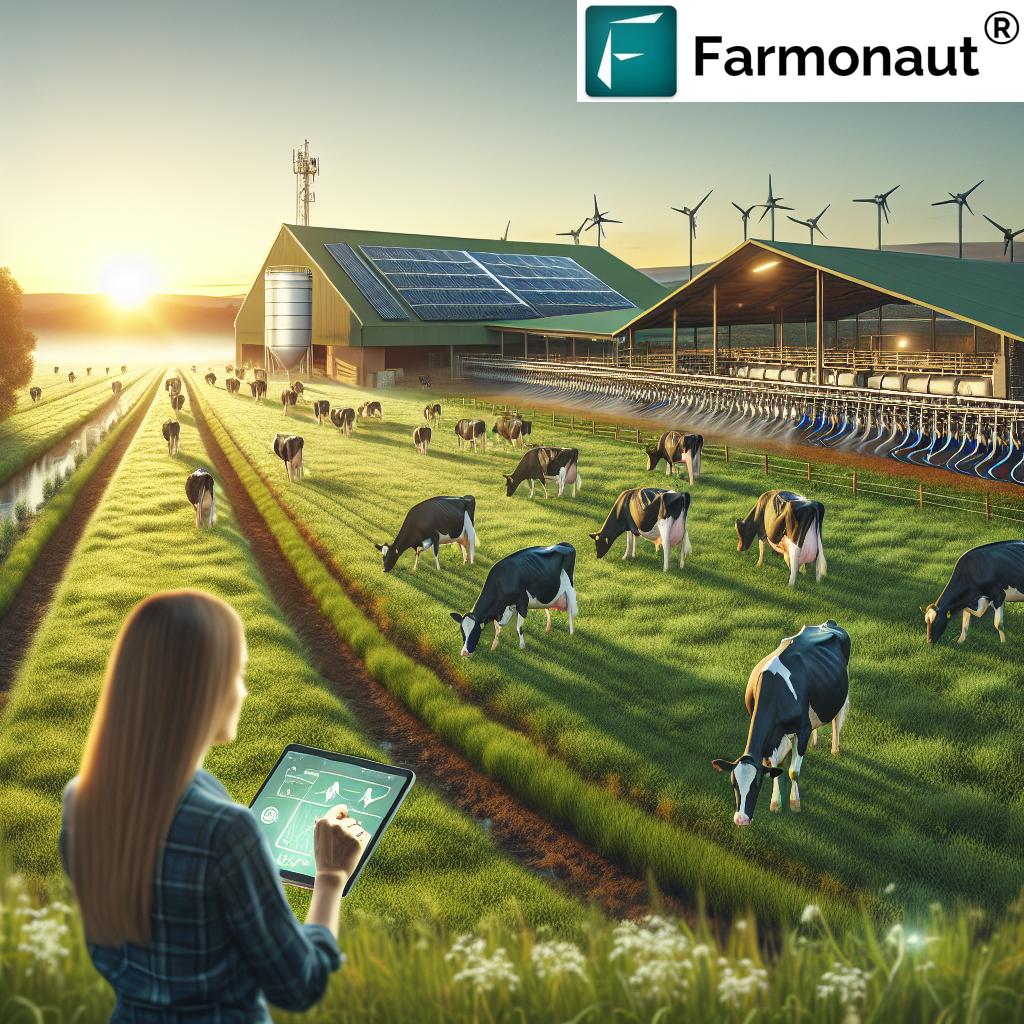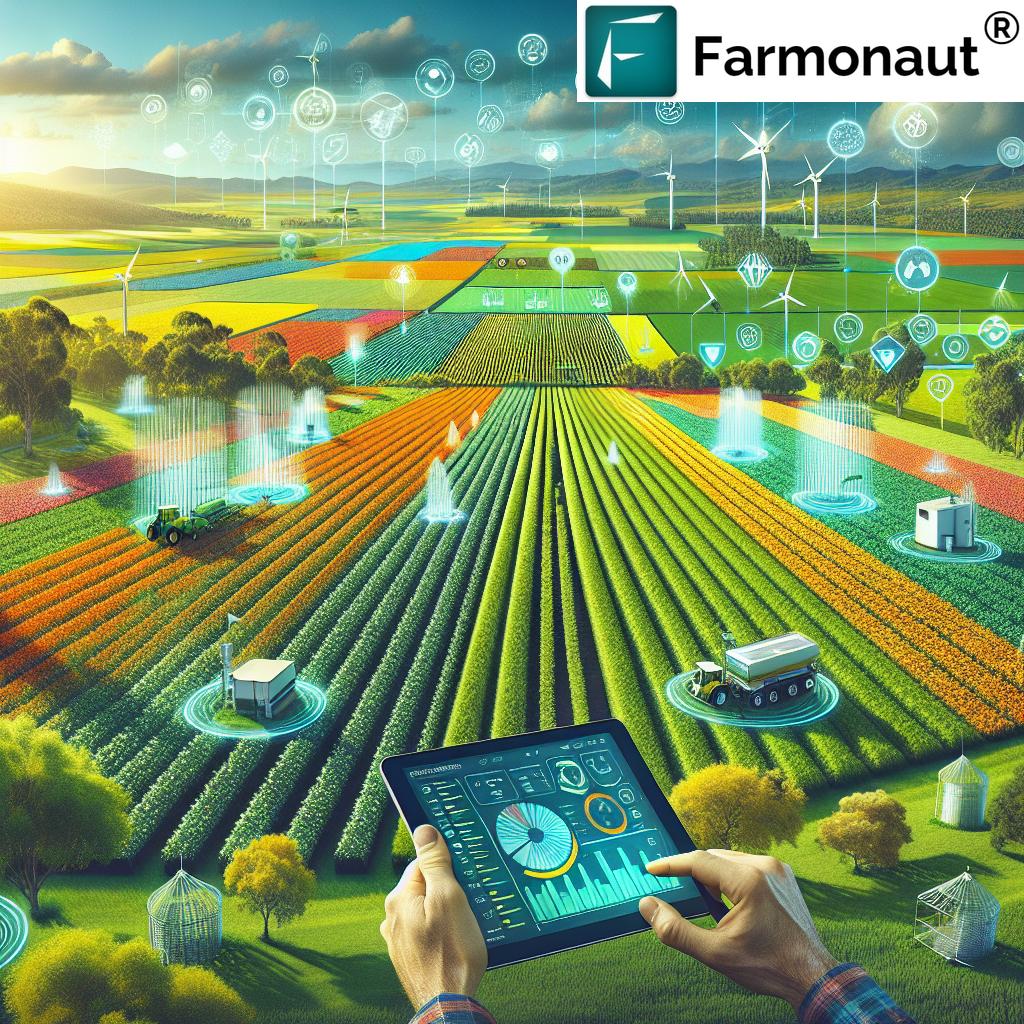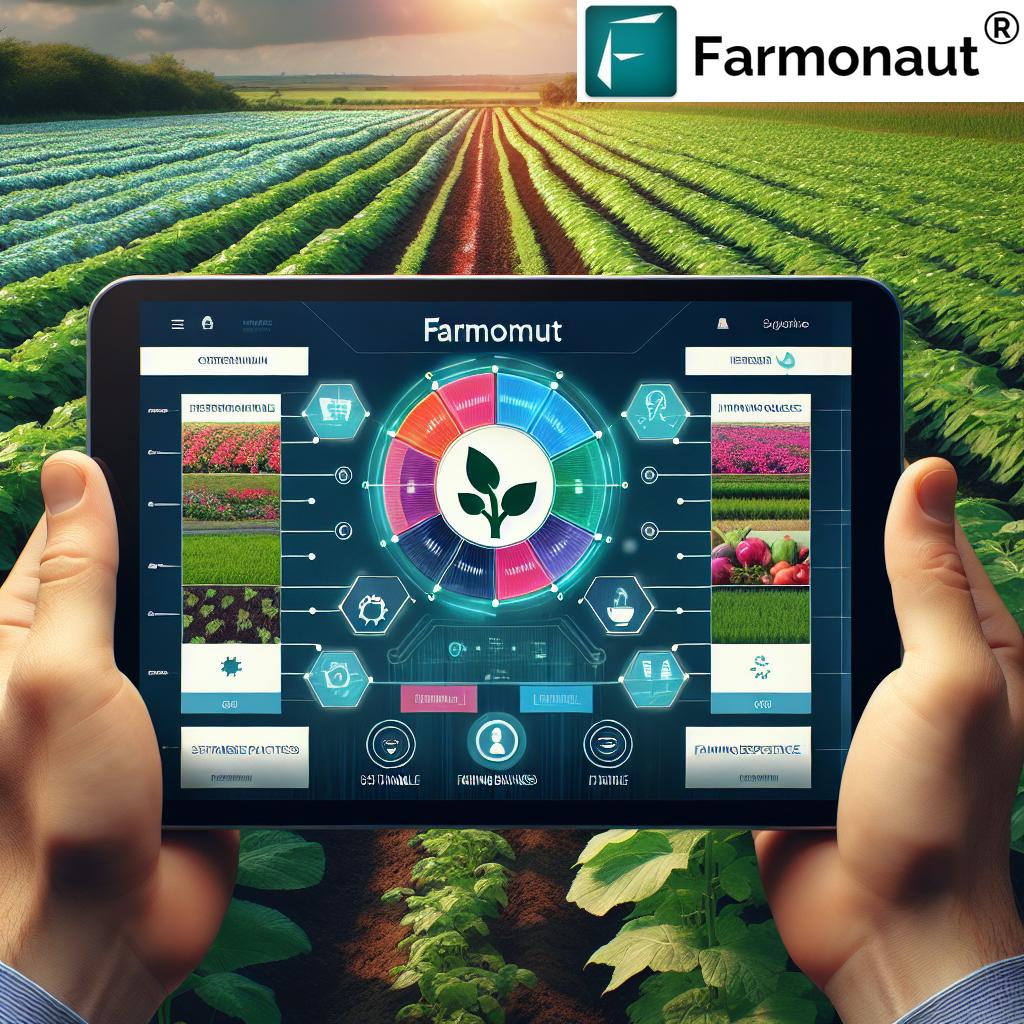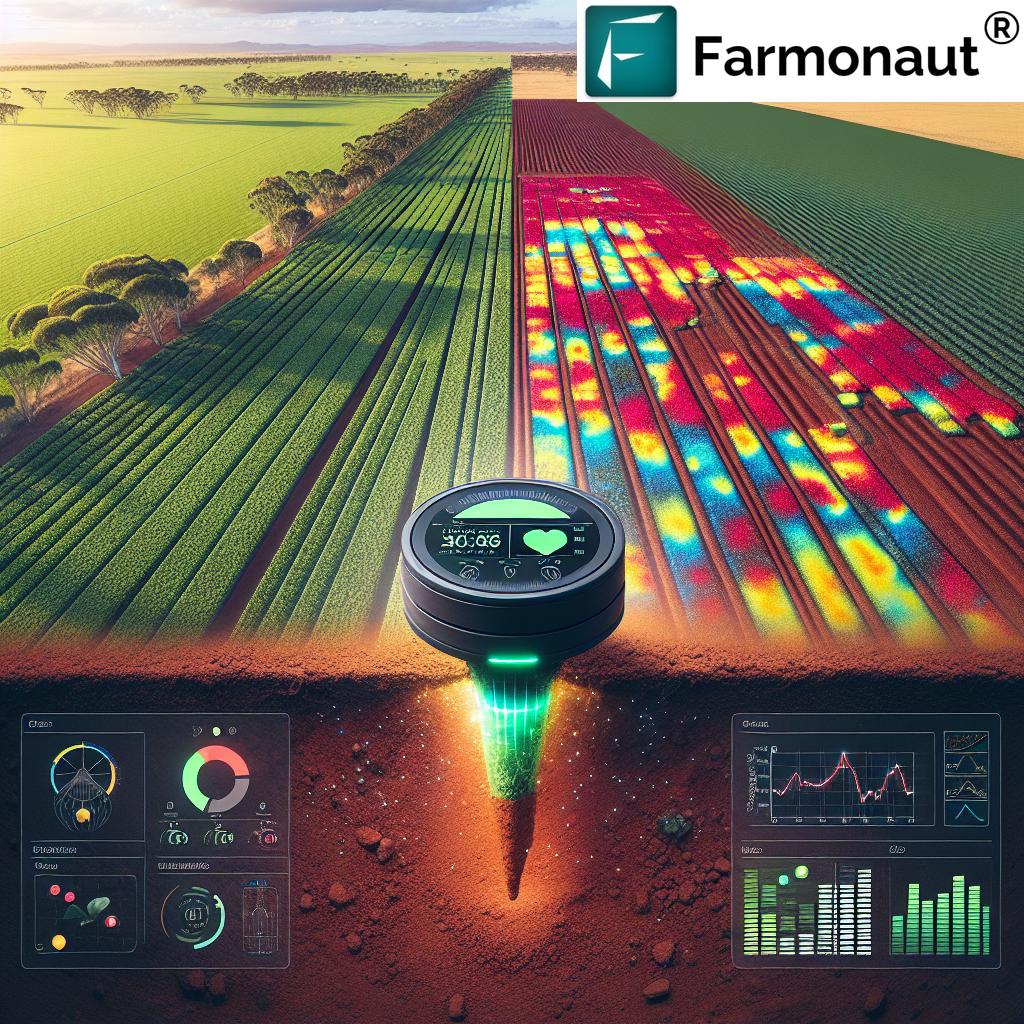Australian Agriculture 2024: Navigating Climate Resilience and Productivity Trends with Farmonaut’s Precision Technology

“Australian agriculture’s economic outlook for 2024 is influenced by over 15 key factors, including climate resilience and global supply dynamics.”
As we delve into the landscape of Australian agriculture in 2024, we find ourselves at a pivotal juncture where innovation, resilience, and sustainability converge. The agricultural sector, a cornerstone of Australia’s economy, faces unprecedented challenges and opportunities. In this comprehensive overview, we’ll explore the latest trends, economic forecasts, and technological advancements shaping the future of farming in the land down under.
Agricultural Productivity Trends: A New Era of Efficiency
Australian agriculture has long been synonymous with resilience and adaptability. In 2024, we’re witnessing a remarkable shift towards enhanced productivity through innovative practices and cutting-edge technologies. The integration of farm data has become paramount, allowing farmers to make informed decisions based on real-time insights.
- Precision agriculture technologies are at the forefront, with satellite-based monitoring systems like those offered by Farmonaut leading the charge.
- Crop yield forecasting has become more accurate, thanks to advanced AI and machine learning algorithms.
- Water usage efficiency has improved significantly, addressing one of Australia’s perennial challenges.
These advancements are not just incremental; they represent a paradigm shift in how we approach farming in Australia. The adoption of agtech innovations is transforming traditional practices, enabling farmers to do more with less and minimize environmental impact.
Climate Resilience: Adapting to a Changing World
Climate change remains one of the most pressing issues facing Australian agriculture. The need for climate resilience in agriculture has never been more critical. Farmers across the country are implementing strategies to mitigate risks and adapt to changing weather patterns.
- Drought-resistant crop varieties are gaining popularity, especially in regions prone to water scarcity.
- Innovative irrigation systems are being deployed to conserve water and improve distribution efficiency.
- Soil health management practices are evolving to enhance carbon sequestration and improve overall farm resilience.
Farmonaut’s satellite-based crop monitoring technology plays a crucial role in this adaptation process. By providing farmers with timely data on crop health, soil moisture, and potential climate-related risks, it enables proactive decision-making and resource allocation.
Sustainable Farming Practices: The Path Forward
Sustainability is no longer just a buzzword; it’s a necessity. Australian farmers are increasingly adopting sustainable farming practices that not only benefit the environment but also improve long-term farm viability.
- Regenerative agriculture techniques are gaining traction, focusing on soil health and biodiversity.
- Precision fertilizer application, guided by satellite data, is reducing chemical runoff and improving nutrient efficiency.
- Integrated pest management strategies are minimizing pesticide use while maintaining crop health.
These practices align perfectly with Farmonaut’s mission to make precision agriculture accessible and affordable. By leveraging satellite imagery and AI-driven insights, farmers can optimize their operations for sustainability without compromising productivity.
Explore Farmonaut’s innovative solutions:
Agricultural Workforce: Evolving Skills and Diversity
The face of Australian agriculture is changing. The agricultural workforce is becoming more diverse, tech-savvy, and specialized. This transformation is crucial for the sector’s future success.
- Digital literacy is becoming as important as traditional farming skills.
- There’s a growing emphasis on attracting young people to agriculture through education and innovation.
- Gender diversity in the agricultural workforce is improving, bringing new perspectives and ideas.
As farms become more technologically advanced, the need for skilled professionals who can interpret data and manage complex systems is increasing. Farmonaut’s user-friendly interface and comprehensive training resources are helping bridge this skills gap, making advanced agricultural technologies accessible to farmers of all backgrounds.
Biosecurity Measures: Safeguarding Australia’s Agricultural Future
In an interconnected world, biosecurity has never been more critical. Australia’s isolation has historically provided some natural protection, but vigilance remains essential.
- Advanced surveillance systems are being implemented to detect potential threats early.
- Strict quarantine measures continue to be enforced to prevent the introduction of exotic pests and diseases.
- Research into pest-resistant crop varieties is ongoing, providing an additional layer of protection.
Farmonaut’s satellite monitoring capabilities contribute to biosecurity efforts by allowing for rapid detection of anomalies in crop health, which could indicate pest or disease outbreaks. This early warning system is invaluable for maintaining the integrity of Australia’s agricultural production.
“Farmonaut’s satellite-based crop monitoring technology integrates data from more than 5 different sources to revolutionize agricultural management in Australia.”
Economic Outlook: Navigating Global Markets
The Australian agriculture economic outlook for 2024 is cautiously optimistic, influenced by a complex interplay of global and domestic factors.
- Export values are expected to remain strong, particularly for key commodities like wheat and beef.
- The ongoing recovery from recent droughts is contributing to improved production forecasts.
- Global supply chain disruptions continue to present both challenges and opportunities for Australian producers.
In this dynamic environment, the ability to make data-driven decisions is more valuable than ever. Farmonaut’s precision agriculture technologies provide farmers with the insights they need to optimize production and respond quickly to market changes.
Precision Agriculture Technologies: The Digital Revolution
The adoption of precision agriculture technologies is transforming Australian farms. These tools are enabling unprecedented levels of efficiency and sustainability.
- Satellite imagery and remote sensing are providing detailed insights into crop health and soil conditions.
- IoT devices and sensors are allowing for real-time monitoring of farm conditions.
- AI and machine learning algorithms are helping farmers predict yields and optimize resource allocation.
Farmonaut is at the forefront of this revolution, offering cutting-edge satellite-based crop monitoring solutions that are both powerful and accessible. By democratizing access to these technologies, Farmonaut is helping farmers of all sizes compete in an increasingly sophisticated market.
Explore Farmonaut’s API solutions: Farmonaut API | API Developer Docs
Crop Yield Forecasting: Precision in Prediction
Accurate crop yield forecasting is crucial for farm planning, market stability, and food security. In 2024, we’re seeing significant advancements in this area.
- Machine learning models are integrating historical data, real-time satellite imagery, and climate forecasts for more accurate predictions.
- These forecasts are helping farmers make informed decisions about planting, harvesting, and marketing their crops.
- Government agencies are using these predictions to inform policy decisions and manage national food security strategies.
Farmonaut’s advanced algorithms contribute to this predictive capability, offering farmers insights that were previously available only to large agribusinesses. This democratization of information is leveling the playing field and improving overall sector efficiency.
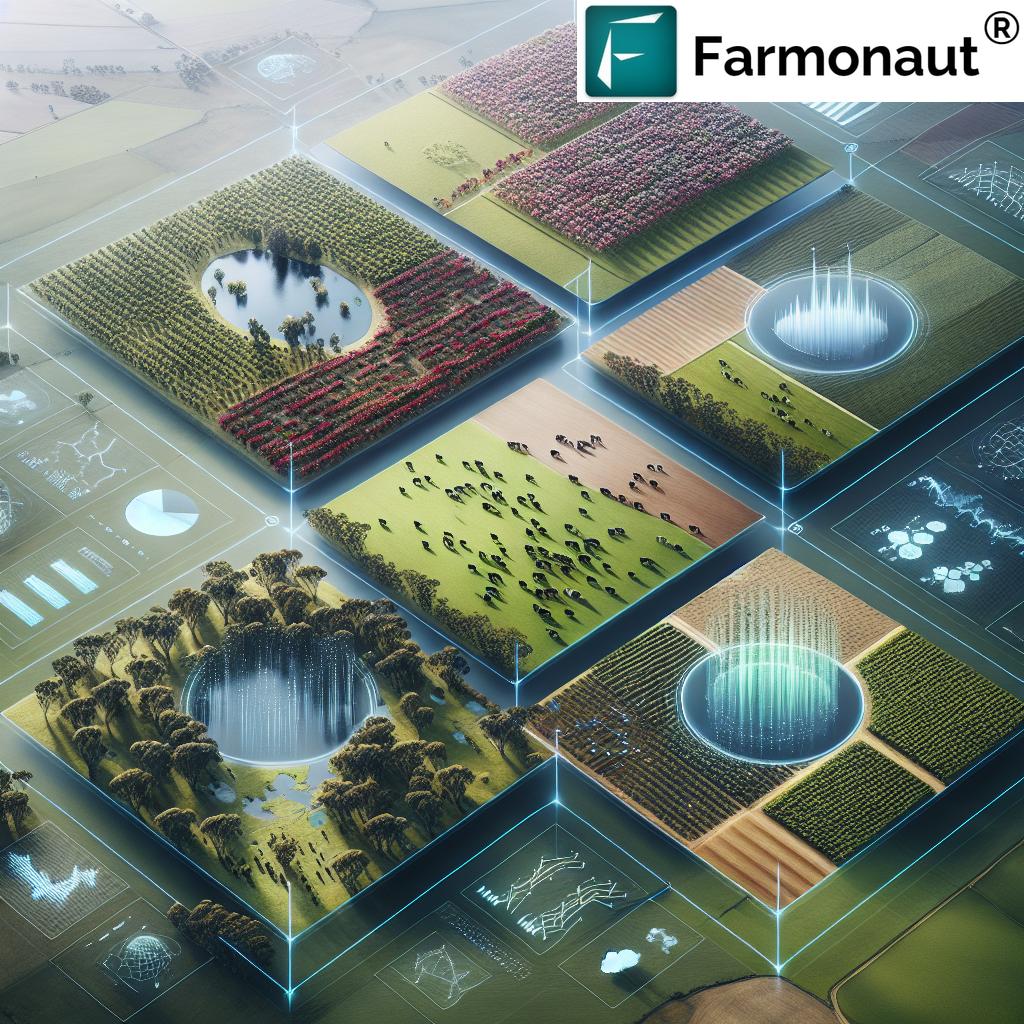
Agtech Innovation and Adoption: Driving Progress
The pace of agtech innovation in Australia is accelerating, with new solutions emerging to address long-standing challenges.
- Robotics and automation are reducing labor costs and improving efficiency in tasks like harvesting and weeding.
- Blockchain technology is enhancing traceability in the supply chain, improving food safety and consumer trust.
- Virtual and augmented reality applications are being used for training and remote farm management.
Farmonaut’s commitment to continuous innovation aligns perfectly with this trend. By regularly updating its platform with new features and capabilities, Farmonaut ensures that Australian farmers have access to the latest in agricultural technology.
Farm Data Integration: The Power of Information
The integration of diverse data sources is revolutionizing farm management practices. This holistic approach to data is enabling more informed decision-making and strategic planning.
- Weather data, market trends, and on-farm sensors are being combined to create comprehensive management dashboards.
- AI-powered analytics are helping farmers interpret complex data sets and extract actionable insights.
- Cloud-based platforms are facilitating data sharing and collaboration across the agricultural value chain.
Farmonaut’s platform exemplifies this integrated approach, bringing together satellite imagery, weather data, and AI-driven analytics in a user-friendly interface. This comprehensive view allows farmers to make decisions based on a full understanding of their farm’s conditions and market context.
Australian Agriculture Sector Overview 2024
| Indicator | 2024 Forecast | Change from 2023 | Climate Impact | Farmonaut Solution |
|---|---|---|---|---|
| Wheat Yield | 28.5 million tonnes | +5% | Moderate drought risk | Crop health monitoring |
| Barley Production | 10.2 million tonnes | +3% | Increased heat stress | AI-based advisory |
| Livestock Export Value | $23.7 billion | +2% | Pasture quality concerns | Vegetation health tracking |
| Water Usage Efficiency | 85% efficiency | +10% | Critical for adaptation | Soil moisture monitoring |
| Precision Ag Adoption | 65% of farms | +15% | Essential for resilience | Accessible satellite monitoring |
The Role of Farmonaut in Australia’s Agricultural Future
As we navigate the complexities of Australian agriculture in 2024, Farmonaut’s role becomes increasingly significant. By providing affordable and accessible precision agriculture solutions, Farmonaut is empowering farmers across Australia to:
- Enhance their climate resilience through data-driven decision-making
- Optimize resource use, leading to more sustainable farming practices
- Improve crop yields and quality through timely interventions
- Reduce operational costs by maximizing efficiency
Farmonaut’s satellite-based crop monitoring technology is particularly well-suited to Australia’s vast and diverse agricultural landscape. It offers farmers the ability to monitor large areas efficiently, detect issues early, and respond promptly to changing conditions.
Looking Ahead: The Future of Australian Agriculture
As we look to the future, several key trends are likely to shape the trajectory of Australian agriculture:
- Continued focus on sustainability and environmental stewardship
- Increased adoption of AI and machine learning in farm management
- Greater emphasis on traceability and transparency in the supply chain
- Ongoing adaptation to climate change through innovative practices and technologies
Farmonaut is well-positioned to support Australian farmers in navigating these trends. By continuously evolving its platform and staying at the forefront of agricultural technology, Farmonaut will remain a valuable partner in the ongoing transformation of Australian agriculture.
Conclusion: Embracing Innovation for a Resilient Future
Australian agriculture in 2024 stands at a crossroads of challenge and opportunity. The sector’s ability to embrace innovation, adapt to climate change, and leverage data-driven insights will be crucial in determining its future success. Farmonaut’s precision agriculture technologies offer a powerful tool in this journey, providing farmers with the information and insights they need to thrive in an ever-changing landscape.
As we move forward, the integration of advanced technologies like those offered by Farmonaut will be key to ensuring the resilience, productivity, and sustainability of Australian agriculture. By harnessing the power of satellite imagery, AI, and data analytics, Australian farmers are well-equipped to meet the challenges of tomorrow and continue their vital role in feeding the nation and the world.
Farmonaut Subscriptions
Frequently Asked Questions
- How is climate change affecting Australian agriculture?
Climate change is impacting Australian agriculture through increased frequency of droughts, heatwaves, and extreme weather events. This is leading to changes in crop suitability, water availability, and pest and disease patterns. - What role does precision agriculture play in improving farm productivity?
Precision agriculture uses technologies like satellite imaging and IoT sensors to provide detailed, real-time information about farm conditions. This allows for more precise application of inputs, better resource management, and improved decision-making, ultimately leading to higher productivity. - How is Farmonaut contributing to sustainable farming practices in Australia?
Farmonaut’s satellite-based crop monitoring helps farmers optimize resource use, reduce waste, and make data-driven decisions. This leads to more sustainable practices such as precise irrigation, targeted fertilizer application, and early pest detection. - What are the main challenges facing the Australian agricultural workforce?
Key challenges include an aging workforce, the need for digital skills, attracting young people to the sector, and adapting to new technologies. There’s also a focus on improving diversity and inclusion in the industry. - How is agtech innovation helping Australian farmers compete globally?
Agtech innovations are improving efficiency, reducing costs, and enhancing product quality. This helps Australian farmers remain competitive in global markets despite challenges like distance to markets and high production costs.
By embracing these innovations and leveraging platforms like Farmonaut, Australian agriculture is well-positioned to overcome challenges and seize opportunities in the years ahead.


